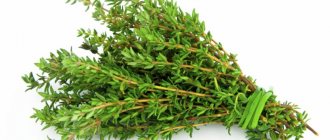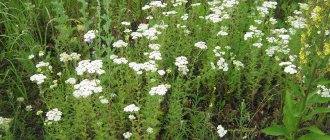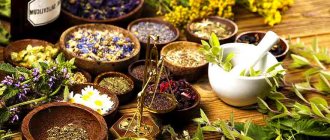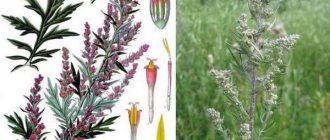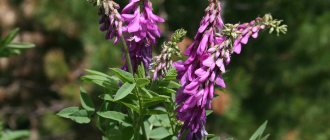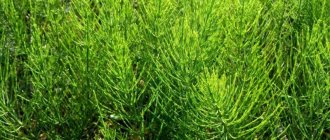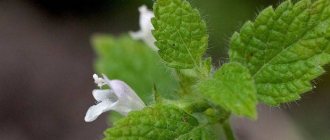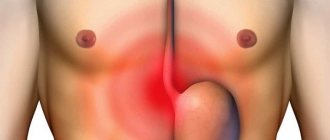What is the healing power of St. John's wort?
St. John's wort is a perennial herbaceous plant 0.3–1.0 m high with stems that grow annually. If you crush the yellow petals of its flowers in your hands, they will turn your skin purple. Since the plant contains a large amount of tannins, its taste is tart and its smell is special and delicate. St. John's wort blooms from mid-June to early September and grows almost everywhere: in clearings, meadows, near roads, in green areas. It is at this time that it is collected. The tops of plants with branches, leaves and inflorescences have healing properties.
St. John's wort is an unpretentious plant that can be found everywhere
It is known that St. John's wort was used as a medicinal plant in ancient Greek medicine. In Russia and Ukraine they first started talking about it only at the beginning of the 19th century.
Compound
Green shoots of grass and flowers contain:
- essential oils;
- flavonoids;
- glycosides;
- saponins;
- resinous ingredients;
- vitamins C, P and PP;
- tanning compounds;
- carotene;
- antibacterial compound imanin;
- volatile phytoncides;
- yellow pigment hypericin;
- nicotinic acid.
The most useful elements are found in flowers.
Unique features of the plant and its effect on the body
This diversity of the chemical structure of St. John's wort explains its versatile therapeutic effects. Taking alcohol and oil tinctures prepared from it enhances photosynthetic phenomena in the human body. This underlies the effectiveness of the plant in the fight against malignant tumors.
Products prepared on its basis have the following effects on the body:
- astringent;
- antibacterial;
- diuretic;
- antispasmodic;
- regenerating.
St. John's wort flavonoids have a number of positive effects on the digestive and urinary systems:
- relieve spasms from the intestinal muscles;
- increase the secretion of gastric juice;
- restore physiological intestinal motility, thereby improving the absorption capacity of the digestive tract;
- dilate blood vessels, bile ducts and ureters;
- prevent stagnation of secretions in the gallbladder;
- prevent stone formation in the kidneys;
- facilitate the release of bile into the duodenum.
St. John's wort has immunity-boosting and hemostatic properties. Due to the fact that the plant contains vitamin P, it reduces capillary permeability and strengthens blood vessels. Preparations based on this herb improve blood circulation and nutrition of the abdominal organs, and also accelerate urine excretion.
The hypericin pigment contained in St. John's wort increases the sensitivity of a living organism to the rays of the sun and regulates important biological processes in the human body. At present, the antidepressant and sedative effect of the plant is no longer in doubt.
It should be borne in mind that of all plant varieties, only St. John's wort (Hypericum perforation) has the above medicinal properties. It can be distinguished from stone, tetrahedral and other varieties of the plant by the characteristic holes on the leaves, from which the herb got its name, and by the red juice that is released when the flowers are rubbed in the hands.
Video: interesting things about St. John's wort
Chemical composition
The chemical composition of St. John's wort determines the medicinal properties of the plant. It includes the following mineral components, micro- and macroelements, vitamins:
- tannins are a collection of diverse, complex organic substances belonging to the aromatic series. They have an effect on the intestines, help cope with various diseases and disorders;
- essential oils;
- resinous substances;
- vitamins of groups P and PP;
- ascorbic acid;
- carotene, choline and nicotinic acid;
- macroelements: potassium, calcium, manganese, iron;
- trace elements: magnesium, copper, zinc, cobalt, chromium, aluminum, selenium, nickel.
Most essential oils and resinous substances are contained in inflorescences.
The roots are rich in carbohydrates, saponins, and alkaloids.
It is important to know that a high concentration of components occurs in a fresh plant. For example, freshly squeezed grass juice contains many times more nutrients than a decoction or tincture.
The composition of St. John's wort distinguishes it from other medicinal plants. That is why many drugs contain its extracts and esters.
St. John's wort tablets, for example, are used to relieve anxiety and depression.
St. John's wort - a medicinal plant
Who will benefit from the plant?
Among the people, St. John's wort does not lose popularity even today. Its miraculous healing abilities are used for various diseases:
- catarrh (inflammation) of the intestines and stomach;
- diarrhea;
- stomach and duodenal ulcers;
- liver and gall bladder diseases;
- pyelonephritis;
- tuberculosis;
- cough of any origin;
- flatulence;
- dropsy;
- childhood enuresis;
- heart failure;
- hypertension;
- uterine bleeding;
- cystitis;
- sciatica;
- hemorrhoids.
Its bactericidal property is used in patients with gingivitis and stomatitis, and in surgery for healing wounds and burns. In addition, St. John's wort is widely used as an appetite stimulant and fever reliever.
The healing properties of the plant have found their application in cosmetology. St. John's wort extract is included in many shampoos, creams, lotions and other face and hair care products. With the help of this plant, the problem of increased skin greasiness and acne is successfully solved. Rinsing hair with St. John's wort infusion helps get rid of dandruff, improves its appearance and health. Cosmetics from this herb can easily be prepared at home.
St. John's wort is widely used in the manufacture of hair care products.
St. John's wort is a tonic and sedative for insomnia, headaches and increased nervousness. Moreover, the antidepressant and calming properties of the plant’s bioflavonoids are used when prescribing its preparations for:
- itching caused by skin diseases;
- manic-depressive syndrome;
- hypochondria (feelings of anxiety, restlessness, apathy, depression);
- nervous exhaustion;
- excitement from severe pain.
Taking St. John's wort improves people's mental and physical well-being, increases their ability to work, normalizes night's sleep and improves their mood.
Video: grass for 99 diseases
Can St. John's wort be used for children and how does it help?
St. John's wort can be used externally for a child from the moment of his birth - in the form of baths, soaps, creams and oils.
To prepare a bath with St. John's wort you need 30 grams. pour 1.5 liters of boiling water over the herbs, leave for about an hour, strain, and then add to the bath with bathing water. This procedure is carried out for no more than 5 minutes, the frequency of such baths is no more than twice every seven days.
There are many different products on sale for caring for baby skin:
- Baby soap with St. John's wort extract - bar soap for sensitive skin with an anti-inflammatory effect. The price per piece is 30 rubles.
- Liquid soap My duckling 2 in 1 with St. John's wort and chamomile - disinfects and cleanses the baby's skin well and is used to wash the child from birth. Price for 250 ml. – 90 rubles.
- My Baby Shampoo “St. John’s wort” is for children’s hair, does not contain sulfates and does not sting the eyes. Price 65 rubles per bottle.
- St. John's wort massage oil heals the umbilical cord in newborns, relieves inflammation, relieves pain, nourishes and softens the skin. Price for 10 ml. – 460 rubles.
- Bath foam "Sun and Moon" baby series and St. John's wort - cares for children's skin very well. Added to bathing water. Its price is for 200 ml. – about 90 rubles.
- Toothpaste “Sunny Bunny” - St. John's wort has anti-inflammatory, antibacterial and wound-healing effects. It is used for stomatitis and periodontal disease, relieves toothache, reduces bad breath. Therefore, St. John's wort is included in medicinal toothpastes. They consist only of herbs and natural ingredients. They clean teeth well, remove plaque, and do not damage tooth enamel. Price per tube – 70 rubles.
Contraindications and side effects
Absolute contraindications to taking St. John's wort preparations are:
- hypersensitivity to plant components;
- severe current depression;
- photodermatitis, including previous ones;
- the need to take other antidepressant medications during this period;
- pregnancy and breastfeeding;
- The patient's age is under 12 years.
Since St. John's wort constricts blood vessels and increases blood pressure, people suffering from hypertension should take it with great caution and only as part of herbal preparations. That is, so that other components balance its hypertensive effect.
The following adverse reactions from consuming St. John's wort are possible, but not necessary:
- dry mouth;
- nausea;
- pain in the stomach;
- intestinal disorders;
- bloating.
In people prone to allergies, the use of St. John's wort can cause corresponding reactions of the skin and mucous membranes:
- rash;
- itching;
- eczema;
- areas of pigmentation;
- sensitivity to dog and cat hair;
- intolerance to sunlight (mainly in HIV-infected patients).
St. John's wort is low-toxic, but in the medical literature one can find suggestions that, when used for a long time in large doses, it has a detrimental effect on human germ cells. There are references to the possibility of reducing potency in men.
St. John's wort contraindications for use
It is strictly forbidden to continue taking St. John's wort without a break for more than 1 month. Self-medication is also excluded, despite its plant origin, it is still a medicinal product that has a number of dangerous properties (we will consider them below).
St. John's wort has an unpleasant property for medicinal plants; it concentrates cadmium. Cadmium is dangerous to the human body due to its carcinogenic properties. The highest concentration appears in industrial zones, in areas of oil and gas plants and along the sides of highways; it is recommended to collect plants away from such areas.
It is worth noting that taking St. John's wort is not accompanied by drowsiness or a decrease in reaction speed. Therefore, official herbal medicines are available without a prescription. General contraindications include:
- Joint use of St. John's wort and antibacterial / heart drugs / contraceptives - the plant can neutralize or significantly reduce the effect of the drug;
- St. John's wort is contraindicated in children under 12 years of age (7 spans in the forehead). In individual cases, the pediatrician may prescribe baths with St. John's wort decoction for children over 5 years old;
- Taking St. John's wort during breastfeeding. Milk absorbs the taste of bitterness and the child may refuse to feed;
- Also during pregnancy. Against the background of hormonal changes, you should refrain from any herbal preparations;
- It is important to refrain from visiting the solarium and the beach, as well as prolonged exposure to the sun. The hypericin contained in the composition increases the susceptibility of ultraviolet rays. This plant property can take a detrimental turn for livestock.
- Animals with light coats may injure themselves due to dermatitis. Such poisonings most often occur in sheep, horses and pigs. The first sign of overdose in ruminant cattle is severe itching of the skin, due to which the animal tears itself until it bleeds, followed by swelling of the muzzle. In the future, this can cause ulcers, so you should be more attentive to animals with direct access to St. John's wort fields.
- Hypertension – the plant increases blood pressure, which can affect the well-being of hypertensive patients;
- Men treating prostatitis with St. John's wort should consult and be monitored by a doctor. The period of use must be limited to a few weeks, otherwise there is a risk of experiencing temporary impotence. It will disappear without a trace in 2-3 weeks, but there is a risk of psychological shock;
- For those suffering from arrhythmia, tachycardia, vascular sclerosis, St. John's wort is prohibited due to its vasoconstrictor properties. It also increases the speed of contraction of the ventricles of the heart, thereby causing blood to flow faster. When treating gastritis, you need to be more careful; on the contrary, an excessively strong infusion can provoke it;
Collection and procurement of raw materials
St. John's wort blooms in the summer. At the same time, it is collected. The upper part (25-40 cm) is carefully separated near the ground, then connected into bundles.
We choose a suitable place for drying bouquets; any place in the shade will do, but always in the open air or in a dry, ventilated room. Dry plants can be easily rubbed with your hands.
The entire plant is used in tinctures and decoctions, with the exception of the roots. Nowadays, you can use a faster method and buy St. John's wort at your nearest pharmacy. Its shelf life is 3 years. Canvas bags or bundles have long been worthy storage methods. The bunches are hung with the flowers facing down.
Drug interactions
Preparations based on St. John's wort may reduce the effect of anticoagulants containing warfarin as the main active substance (for example, Marevana). It is not recommended to use them simultaneously with any products based on the plant in question, since when using this combination, the activation of the action of warfarin can continue for 14 days after stopping the use of drugs containing St. John's wort. If this combination is prescribed, the patient should undergo regular laboratory monitoring of blood clotting parameters.
When taken together with sulfonamides, tetracyclines, quinolones, Piroxicam and diuretics, products with St. John's wort can enhance their photosensitizing effect. In other words, increase the sensitivity of human skin to sunlight.
St. John's wort prolongs narcotic sleep, into which the patient is medicated for general anesthesia, but shortens that caused by certain hypnotic drugs (barbiturates). When taken simultaneously with drugs that lower blood pressure (for example, with Reserpine), the plant can negate their hypotensive effect. It also reduces the effectiveness of cardiac glycosides (Digoxin).
Women taking oral contraceptives (OCs) should be aware that the simultaneous use of St. John's wort preparations increases the likelihood of intermenstrual bleeding.
Despite the fact that this medicinal plant increases the effectiveness of other antidepressants (for example, Nefazodone, Paroxetine, Sertraline), when taken in parallel with them, the risk of developing hypertensive crises increases. Therefore, the interval between treatment cycles with other sedatives and St. John's wort preparations should be at least 2 weeks.
This herb should not be used together with medications prescribed for AIDS and cytostatics. In all cases where the patient is taking any other medications, he should consult a doctor before using St. John's wort.
Treatment of diseases of the nervous system
An infusion of St. John's wort herb helps eliminate depression. What does the herb St. John's wort treat? Effectively treats insomnia, neuralgia, relieves irritability and headaches. It is useful to drink tea, which is prepared by mixing herbs: St. John's wort, lemon balm, blueberries, rosemary leaves. It helps with depression.
Contraindications to treatment with St. John's wort
A course of treatment with St. John's wort is recommended, since constant use can provoke the appearance of urticaria and problems with potency.
- Women taking contraceptives should be careful when taking medications with St. John's wort, as they weaken the effect of the medications.
- An overdose of an infusion of a medicinal plant leads to headaches, vomiting and nausea.
- If you have an elevated temperature or are taking antibiotics, you should not drink St. John's wort infusion.
- During pregnancy, St. John's wort tincture can cause miscarriage.
- You should avoid drinking alcohol, smoked foods, chocolate and coffee during treatment.
- It is necessary to abandon antidepressants if treatment with St. John's wort is carried out. Otherwise, dizziness and confusion may occur.
- For peptic ulcers and gastritis, you need to be careful to avoid overdose. Otherwise your stomach will hurt.
You should not start treatment with St. John's wort without consulting your doctor. This plant should absolutely not be taken for the treatment of nephritis and hypertrophic cirrhosis of the liver. St. John's wort has the unique property of increasing sensitivity to ultraviolet radiation. You should not sunbathe during treatment. People suffering from heart disease should be careful.
Overdose
If you take St. John's wort for an excessively long time, the body may become oversaturated, which manifests itself in allergic reactions. If skin irritation occurs, avoid exposure to the sun for 10–15 days. It is better to prevent ultraviolet rays from coming into contact with the skin during the entire treatment period.
When using products containing St. John's wort, you should limit your time in the sun
When consuming too much of St. John's wort, iron deficiency anemia (anemia) sometimes develops. The central nervous system may respond to an overdose with headache, increased fatigue, and anxiety. Therefore, every 2-3 months you need to take 2-3 week breaks in taking medications from this plant.
Pharmacological properties
St. John's wort has unique pharmacological properties, which is why it has found use in folk medicine and medications.
Preparations based on St. John's wort have an anti-inflammatory, antiseptic effect and act as a natural antibiotic. In addition, such drugs promote accelerated tissue regeneration and cell renewal.
Decoctions and infusions based on this plant can be a good way to prevent many diseases, since the components included in the composition help to increase tone and overall strengthen the body.
The flavonoids contained in St. John's wort have a beneficial effect on the intestinal muscles and help improve peristalsis - the passage of feces.
They also have a beneficial effect on the bile ducts, relieving stagnation of bile and stimulating its outflow. This exposure will reduce the likelihood of kidney stones.
St. John's wort is often included in medications to reduce anxiety and depression.
Such medications help get rid of insomnia, reduce irritability, and feelings of panic. Patients who regularly take sedative preparations based on St. John's wort notice that their performance, brain activity, and concentration increase.
Collection and storage rules
St. John's wort herb is harvested during the flowering period, before the first unripe fruits have appeared. When collecting, cut off the upper part of the plant with flowers about 20 cm long. Medicinal raw materials are dried in cool, shaded, well-ventilated rooms - under canopies or in attics. Or the grass is tied in bunches and hung in the courtyards of private houses (not in the sun!).
St. John's wort has another name - “herb of John the Baptist.” It appeared in Western Europe due to the fact that the most magnificent flowering of the plant was observed on June 24. It is then that the Catholic Church celebrates the birth of the mentioned saint. There is a belief that if you put a sprig of St. John's wort under your pillow that night, John the Baptist will appear in a dream, bless you and protect you from harm this year.
Video: how to properly collect and store St. John's wort
Medicines based on the herb St. John's wort
On pharmacy shelves you can find many different medicines based on St. John's wort.
Such drugs have a wide range of pharmacological properties and can help in the treatment of many diseases.
These drugs include:
- Briquettes based on St. John's wort Herba Hyperici. They are used to treat diseases of the gastrointestinal tract accompanied by diarrhea and colitis. They have a gentle effect on the intestines, reduce pain, and improve peristalsis.
- Novoimanin (Novoimaninum) is a complex medicine, which is a resinous mass with the aroma of honey of a reddish-yellow, orange hue. The drug is available in the format of a solution of 1% concentration in ethyl alcohol. This medicine is used in the treatment of diseases of the throat, respiratory tract, lungs: purulent pleurisy, sore throat, bronchitis, pneumothorax, lung abscess. In addition, the solution is used for external use for infected wounds, abscesses, boils, cellulitis, burns of varying degrees, as well as for the treatment of diseases of the ears and nose.
- Giflarin (Hyflarini) is a medicine based on St. John's wort, used for acute and chronic diseases, nephrosis and nephritis, accompanied by severe intoxication of the body, kidney and liver failure, and fever. This drug has a strong anti-inflammatory effect, in addition, it helps strengthen the walls of blood vessels.
- Deprim is used as a psychotropic drug with a mild degree of impact. It helps improve mood, reduce feelings of anxiety and fear. Having a gentle effect on the body, Deprim actively fights insomnia, normalizes appetite, performance, and mental abilities.
- St. John's wort tincture (Tinctura Hyperici) is widely used by dentists as an anti-inflammatory astringent. The drug is used for rinsing after treatment to reduce swelling and pain. It is also allowed to take it internally, 20-30 drops, after mixing with water.
- Imaninum is a drug that acts as a natural antibiotic. It actively fights many types of microbes and harmful bacteria, and is widely used in the treatment of abscesses, infected burns of varying degrees, and also to reduce pain from ulcers and gastritis.
St. John's wort is a component of many medicines.
A medicinal herbal mixture based on St. John's wort is also widely used. It is often used in combination with drug treatment to help the body cope with increased stress.
St. John's wort herb
Treatment with St. John's wort
There is no need to be afraid that a few days after the start of treatment with St. John's wort, the underlying disease may worsen for a short time - this is normal. During this period, a kind of “restructuring” occurs in the body due to the action of the healing powers of the plant. But if the drug clearly does not help, you need to stop taking it and think about other methods of therapy.
St. John's wort in traditional medicine
In comparison with the treatment of psychological and nervous disorders with traditional medications, products with St. John's wort are not addictive and, when the dose is correctly selected, have virtually no unwanted effects.
In the pharmacy network you can choose any of the sedative medications containing this herb:
- Novo-Passit;
- Arfazetine;
- Brusniver;
- Prostanorm;
- Doppelhertz;
- Sibektan;
- Life;
- Herbion Hypericum;
- Negrustin.
In some cases, doctors prescribe St. John's wort preparations for peripheral circulation disorders accompanied by congestion.
In official medicine, herbs or tinctures of St. John's wort, plant oil, as well as antibacterial drugs Imanin and Novoimanin are used. The latter are prescribed for external treatment and anesthesia of purulent wounds, burns, cellulitis, boils and carbuncles, cracked nipples, tonsillitis and sinusitis.
They are also used in the treatment of:
- diseases of the mouth and throat;
- stagnation of bile in the gallbladder;
- cholecystitis;
- cholelithiasis and urolithiasis;
- inflammatory processes in the stomach and intestines;
- hepatitis;
- functional kidney disorders.
In dentistry, St. John's wort is used as an anti-inflammatory and astringent.
Photo gallery: pharmaceutical preparations containing St. John's wort
Novo-Passit is a sedative with components of plant origin, one of which is St. John's wort.
Brusniver is a herbal remedy that has a diuretic, antimicrobial and anti-inflammatory effect.
Negrustin is a herbal drug with antidepressant activity.
Prostanorm is a herbal medicine used for prostate diseases.
Sibektan is a herbal medicine with hepatoprotective and choleretic effects
St. John's wort and traditional medicine
Traditional healers have come up with a great variety of potions from this magical herb.
Alcohol tincture
For rheumatic disorders, alcohol tincture of St. John's wort is used as an external pain reliever. It is used to rub the joints and lower back. It is prepared like this:
- Pour 20 g of plant material into 100 ml of 70% alcohol.
- Leave for 14 days.
- Then filter and squeeze out the product, pour it into a dark glass container and store in a cool, dry place.
It is recommended to lubricate the gums with a tincture of the plant to strengthen them, and rinse the mouth with it to eliminate bad odor in cases of gingivitis, stomatitis, and periodontal disease. To do this, dissolve 20–40 drops of the product in a glass of water.
Alcohol tincture of St. John's wort can be lubricated:
- infected wounds;
- abscesses;
- shells;
- boils;
- trophic ulcers;
- burns.
It increases the regenerative properties of tissues.
Video: how to prepare medicinal St. John's wort tincture
St. John's wort oil
For stomach ulcers, gall bladder diseases and kidney stones, St. John's wort oil is taken orally. It can serve as a pain reliever and dewormer.
You need to take it 1-2 tsp. half an hour before meals or 3 hours after meals, 2-3 times a day for 1-2 months.
Ready-made St. John's wort oil can be bought at a pharmacy
St. John's wort oil is also used for extensive burns - it will help even if more than 60% of the body surface is affected. Lotions soaked in it are applied to the affected areas of the skin. Oil compresses are made on ulcers, abscesses, festering wounds, and loosening of the oral mucosa. The product lubricates skin damage caused by animals, acne on the face, cracked nipples in nursing women.
To prepare St. John's wort oil, you can use any of the following recipes:
- 4 tbsp. l. fresh flowers, pour 200 ml of olive oil and leave for 40 days.
- Pour 3 handfuls of St. John's wort flowers into a bottle and pour 1 liter of good vegetable oil. Close the container with a lid and place it in the sun. After 2 weeks, add 2 more handfuls of St. John's wort flowers and leave until the liquid turns dark red.
- Boil 100 g of St. John's wort herb along with inflorescences in 700 ml of fresh sunflower oil. The liquid should simmer quietly for about half an hour. After cooling, filter.
- Infuse a third of a glass of crushed fresh St. John's wort leaves and inflorescences in a glass of any vegetable oil for 20 days. Sunflower, flaxseed, almond or olive are best suited. Squeeze and strain.
- Let a liter jar of crushed plant herbs steep together with flowers in a mixture of 0.4 liters of white wine with 0.8 liters of vegetable oil for 5 days. Then boil the product for 12 minutes so that the alcohol evaporates.
St. John's wort oil must be poured into a dark glass container and kept in the refrigerator.
Video: St. John's wort oil is an excellent antidepressant
St. John's wort tea
St. John's wort tea, drunk daily in large quantities (at least 3-4 cups), treats chronic inflammation in the intestines and diarrhea. To prepare it, take 1 tbsp for 1 cup of boiling water. l. flowers or leaves of a plant. You can use St. John's wort in half with yarrow. Drink 2 glasses of this tea after each meal for 2-3 months.
Healing tea with St. John's wort also works well for nervous exhaustion, emotional fatigue, mental overstrain, and sleep disorders. It will also help students during exam sessions.
Here is another recipe for soothing tea made from a mixture of herbs and St. John's wort:
- Take the herb St. John's wort, angelica root and yarrow flowers in equal quantities.
- 1 tbsp. l. Pour a glass of boiling water over the crushed raw materials.
- Let it sit for a while.
- Drink at night.
St. John's wort in this combination treats insomnia, regenerates and strengthens the nervous system.
A cup of St. John's wort tea, drunk at night, will improve sleep and calm the nervous system.
In the same way, to calm down, you can drink tea made from St. John's wort, lemon balm and linden flowers.
Decoctions
St. John's wort decoction is used for vaginal douching for inflammatory diseases of the female genital organs. To do this, prepare a mixture of the following plants, taken equally:
- tea rose petals;
- flax seeds;
- marigold flowers;
- marshmallow root;
- peppermint herbs;
- nettle root;
- oak bark;
- shepherd's purse herbs;
- larkspur root;
- willow bark;
- cumin flowers;
- mistletoe herb.
Cook 5-6 tbsp. l. this mixture in 3 liters of water for half an hour.
You can prepare the product in another way:
- 4 tbsp. l. St. John's wort herb pour 0.5 liters of boiling water.
- Cover the dish with a lid and simmer in a water bath for 30 minutes.
- Then let stand for 15 minutes and strain.
- Rinse the vagina with warm broth twice a day: in the morning after waking up and in the evening before bed.
You can prepare a decoction for douching only from St. John's wort. For this purpose, 3 tbsp. l. herbs with flowers need to be boiled for 20 minutes in 2 liters of water.
Wounds are washed with a decoction of St. John's wort, and bandages moistened with it are applied to them. For speedy healing, the drug is also taken orally. In addition, a decoction of St. John's wort is drunk as a choleretic and anti-inflammatory medicine for cholangitis and cholecystitis.
Ointment
To eliminate adenoids and nasopharyngeal polyps, prepare St. John's wort ointment:
- Grind the dry herb of the plant to a powder.
- Mix 1 tsp. St. John's wort powder with 3 tsp. unsalted butter.
- Add celandine juice to the resulting composition (5 drops of juice per 1 teaspoon of ointment).
- Pour the product into a dark glass bottle.
- Shake the vessel until an emulsion forms inside it.
Place this medicine 2 drops into each nasal passage 3-4 times a day.
In the same way, you can make an ointment to treat cracked nipples. To do this, mix 1 tbsp. l. St. John's wort decoction with 2 tbsp. l. softened butter.
Infusions
Strong infusions of St. John's wort are very effective for curing gastrointestinal and colds. You can easily prepare them yourself for oral administration, for gargling and for rinsing the nasal passages. To do this, pour 10 g of the plant into 100 ml of boiling water. Drink 1 tbsp. l. four times a day. Pass the infusion through the nose for a runny nose in the morning and at night.
When you have a cold, it is useful to inhale dry powder of St. John's wort herb.
Treatment of cystitis, urolithiasis
St. John's wort herb has a hemostatic, anti-inflammatory, diuretic, astringent effect. This allows St. John's wort to be used for kidney diseases. If you have urolithiasis, you can start treatment with St. John's wort infusion, but only after consulting a doctor. The infusion is prepared according to the classic recipe (1 tablespoon of raw materials per glass of boiling water). It is necessary to drink 100 ml of infusion throughout the day.
Another recipe used for inflammation of the bladder, cystitis. This herbal collection consists of the following herbs:
oregano - 4 tbsp. spoons
knotweed - 4 tbsp. spoons
chamomile - 3 tbsp. spoons
St. John's wort - 8 tbsp. spoons
Brew a mixture of medicinal herbs with a liter of boiling water and leave for 12 hours. Take 100 ml after consultation with a doctor.
The use of St. John's wort for breast and ovarian cysts
Herbal teas can help get rid of cysts that can be resolved. Other types are removed surgically. The danger of a cyst lies in the possible transformation of cells into cancerous ones.
St. John's wort has long been used in alternative medicine as an antiseptic. For example, the medical drug Novoimanin is a 1% alcohol extract that is used to treat boils and purulent wounds.
The plant includes many bioactive substances: flavonoids, alkaloids, quinones, beta-sitosterol, which help cope with pathology.
Preparation of infusion: to 1 tbsp. raw materials, pour a glass of boiling water, let the product sit for half an hour. A cotton cloth is moistened with a warm solution and applied to the chest where the cyst has formed. The duration of the procedure is 20 minutes every day for a month.
For the treatment of ovarian cysts, the following composition is prepared: St. John's wort, tree, wormwood, rose hips, befungin, aloe juice, cognac, honey. Take 18 g three times a day before eating.
Mix the same amount of dry crushed raw materials:
- white willow branches;
- St. John's wort;
- tree;
- bedstraw;
- Veronica;
- horsetail;
- daisies.
To 5 tbsp. l. collection, pour a liter of hot boiling water and keep on low heat for a couple of minutes. Let stand for half an hour, then pass the product through cheesecloth. Drink 18 g of infusion three times a day 30 minutes before eating. The duration of treatment is one and a half months with a two-week break.
Health to you!
The healing properties of St. John's wort for women
As for the use of St. John's wort herb by women for medicinal purposes, the range of its use is quite wide. The plant will help cope with various female diseases, for example:
- pain during menstruation;
- disruptions in the menstrual cycle;
- depression and insomnia during menopause;
- inflammation of the female reproductive system;
- milk release when breastfeeding stops;
- pain arising from uterine prolapse;
- too little discharge during menstruation;
- susceptibility to cervical cancer;
- development of mastitis in nursing mothers during breastfeeding (breastfeeding).
The possibility of using St. John's wort in its various forms is quite extensive: decoctions, oils, tea, etc. You can read about the benefits of the plant for treating a variety of pathologies in the article “St. John's wort - away with all diseases.”
